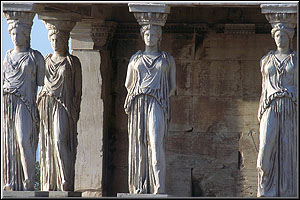
The name Cylon comes from Greek History, in 632 BCE, where Cylon (AKA Kylon), a leader from Croton, tried to unify all of Greece under the sword. Cylon linked his heritage to Theseus and won the Olympian games in 640 BCE. With this success, he seized the throne of Croton and quickly grew in power. With this strength, he forged a new empire of purists through genocide of all foreigners and citizens of tainted blood. They hunted down the last of their enemies, swearing that not one man should be allowed to live, sending entire military units to find and slay individual stragglers and refugees.
Athens finally gathered enough strength to face and defeat Cylon in a battle fought at the base of the Acropolis. Cylon escaped and fled Greek lands, never to return. In the aftermath, reforms like the legal codes of Draco that presented the legal requirements for citizenship (foremost of which was loyalty to the state) and the reforms of Solon that ensured freedom of thought were implemented. These contrasting ideas formed the basis of western civilization, with Draco’s standard punishment being death and Solon’s concepts promoting individual’s rights.
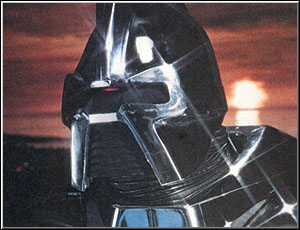
In their original concept, the Battlestar Galactica Cylons were a reptilian race from a far corner of the galaxy. They, like their Greek inspiration, assessed the nature of mankind and declared that all humans must be exterminated down to the last man, woman, and child. Man was simply incompatible with Cylon culture and their goals of obtaining a perfect working society. They believed they were the care-takers of the universe that they maintained through a technologically advanced and well ordered society. They evaluated other races systematically, determining which ones were a threat not only to them but to all beings in the galaxy. Those that weren’t “safe” were identified for extermination. Those useful to the Cylons were included in the Cylon Alliance, often through the use of force.
Cylon society was based on rule by a warrior class, that itself had three distinct orders. The line warriors were the centurions, creatures totally dedicated to progressing the Cylon Empire. Those who showed sufficient prowess and skill would be considered for advancement into the top of the command structure. This advancement was far more than ceremonial.
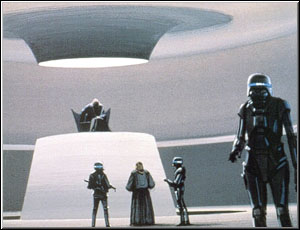
Through their advanced technology, Cylons had learned to integrate an additional brain into their bodies, allowing both to interact and provide the recipient with far more intelligence than any group of individuals could ever hope to achieve. These two-brained Cylons formed the command order of the Cylon Empire, commanding base stars and planets. Those that continued to do well would rise to a position on the ruling council, subservient only to the single three-brained Cylon, the Imperious Leader. Unfortunately, achievements alone never guaranteed advancement. Some Cylons were incompatible with the medical procedure and others died during the process.
The Imperious Leader ruled with absolute power, possessing the highest intelligence in the galaxy. His decisions were absolute, and no Cylon would dare question them. Imperious Leaders who made a serious error in judgment, chose a replacement and committed suicide.
… or so they were supposed to be.
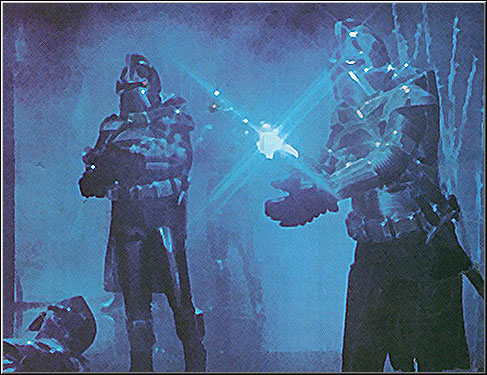
Prior to its debut, the network censors worried about the reaction of viewers seeing scores of living beings slaughtered in battle each week. To alleviate this concern, Universal Studios enforced a last minute change that altered the Cylons from vicious reptiles into warrior robots.
According to their new history, around a thousand yahrens (years) prior to the timeframe of the series, the Cylons were visited by Count Iblis, a being of intense evil. What happened next was never well defined, but through Count Iblis, the reptilian race met its end and were replaced by a machine race that assumed the name Cylon. These robots, under the command of a machine Imperious Leader, whose voice was that of Count Iblis himself, first came at odds with the humans when the Colonials defended a friendly race, the Hasaris, whom the Cylons planned to enslave.
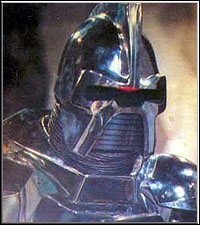
From that point onward, a thousand yahren war continued, with the Cylons intent on destroying all mankind. Both versions of the Cylons wore reflective, chrome armor, with the two-brained or more mechanically advanced leaders wearing shiny golden armor. The centurions were most readily noted for their single roving eye, which moved steadily back and forth surveying everything.
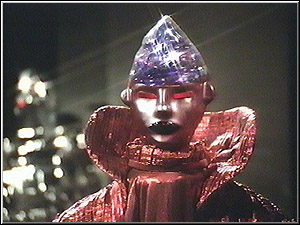
The Cylons also had an IL series robot that served as an advisor and administrator. In the show, the IL Series Cogitors were second only to the Imperious Leader himself, and in fact it was suggested that the Imperious Leaders were selected from their ranks.
The novels that were published, however,followed the concept of the reptilian/cybernetic Cylons, this model Cylon was little more than an ignored experiment.
Whether mechanical or biological, Cylon leaders retained a sense of ambition, a strange quality when compared to the warrior drone’s unwavering dedication to the empire that ran so strong that a drone would readily sacrifice himself to further the goals of the Cylon Empire. Similar ambitions ran through the civilian Cylon population, although the extent of this was never revealed. Cylon technology, although generally a bit more advanced than that of the Colonials, was never well exploited. They had the ability to move planets to new locations but never adapted that technology to build and propel vast warships. In close combat, the Cylons employ powerful energy rifles but also maintain broadswords that they use to slay an enemy that draws too near.
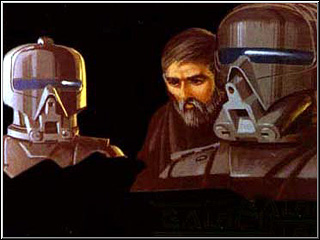
Surprisingly, the races exterminated by the Cylons were removed without malice and were chronicled and remembered by them. The Cylons kept detailed records of all the races they destroyed, including their artifacts. Once an enemy was eliminated, the Cylons adapted all that was left behind.
When the mechanical Cylons discovered humans, they copied their bodies and attempted to copy their ingenuity. In time, they came to understand humans well, and learned what weaknesses to exploit. They became smarter than humans but were never able to understand the unpredictable and sometimes irrational nature of the human mind.
This may have helped the Imperious Leader decide that humans had to be exterminated.